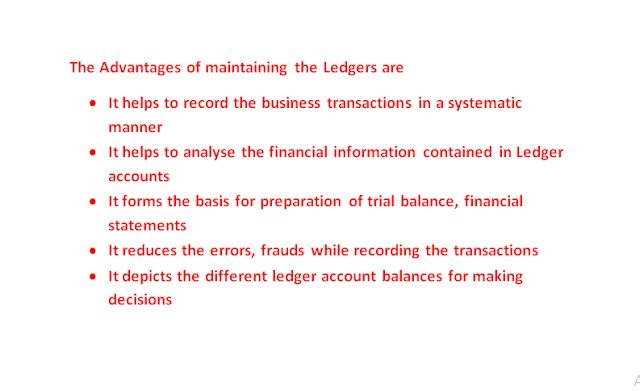Are you all curious to know as to what are the advantages & disadvantages of Ledgers in accounting? Then Let's dive into it. Here we will discuss these points in brief
What are Ledgers in Accounting?
Ledger Balances: Each ledger account has a balance at the end of the account. The totals are calculated and balances are obtained. It may have either a debit balance or a credit balance. All assets, expenses and losses have a debit balance. All income, liabilities, capital, and provision accounts have a credit balance.
What are the advantages & disadvantages of Ledgers?
Let us discuss the benefits, advantages and disadvantages of Ledgers in brief.
The advantages, benefits or uses of maintaining the Ledgers are as follows:
1. It helps in recording the business transactions in the books of accounts in a systematic manner
2. It helps to classify the accounts as Assets, Liabilities, Capital, Expenses, Incomes
3. It follows the double-entry system which is a reliable, scientific, and logical one to record the transactions
4. It forms the basis for the preparation of Trial Balance
5. Also, it forms the basis for the preparation of Financial Statements
6. It helps to analyse the recorded financial information using different ledger accounts
7. It helps to minimize the errors, frauds and omission of transactions in books of accounts
8. It helps to collect and store the financial information in different ledger accounts
9. It also helps in ascertaining the effect of the recorded transactions on the Trial balance & Financial statements as well
10. It helps to depict the different ledger account balances for making useful decisions
The Disadvantages or demerits of maintaining the Ledgers are as follows:
1. Maintaining the Ledgers will be a cumbersome, expensive, complex and complicated task
2. Recording the transactions, posting the ledger accounts and ascertaining the ledger account balance involves clerical work. It is also a time-consuming task.
3. Information contained in the ledger accounts is much sensitive and confidential. Access to this information by any third party/stranger may involve risk or leakage of secret information.
4. Hiring the Bookkeepers & Accountants for record-keeping and maintaining the Ledgers is highly expensive and involves much complex work. It may not be suitable for small business units or sole trading concerns
Conclusion
The advantages & disadvantages of maintaining Ledgers will be helpful to know uses, scope, benefits and limitations of Ledgers. This would be helpful for Big business organisations, This may not be suitable for small business units as mentioned earlier. Comment below your views or opinions, as we are curious to know.


Post a Comment
if you have queries let me know and mail me at syednissaruddin99@gmail.com